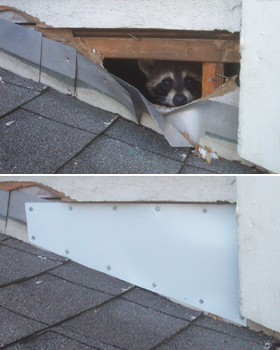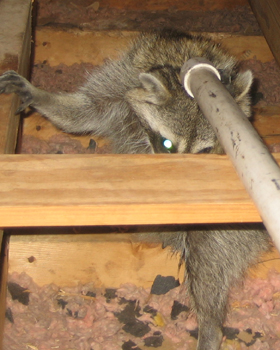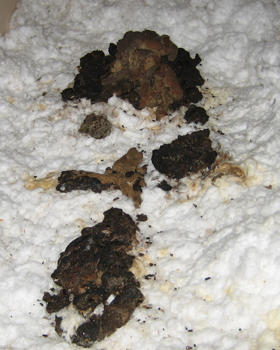What situations call for a professional? - We first encourage you to carefully examine the advice on the how to do it yourself page for your specific wildlife species. If
you find that you can use this advice to solve the problem yourself, great! If not, or if you've tried it on your own already and failed, then it's time to seek outside help. There's a reason there's a professional
nuisance wildlife control industry. These companies (often one-man owner/operator enterprises) often have the benefit of experience, and the proper tools. Here are some examples of cases in which a professional
might be better equipped than a homeowner:
- Raccoons in the attic that did not respond to intimidation techniques
- Any situation in which there is danger from a raccoon that needs handling
- Physical snaring of a sick or injured raccoon
- A raccoon stuck down a wall inside a home or building
- Raccoons that will not leave a chimney with scent techniques
- Any case that absolutely requires cage trapping and removal (see below)
- Any case in which a homeowner lacks confidence about safety or protection of property
- Dangerous repairs on difficult roofs, high chimneys, etc.
- Any professional grade repairs that you are unable to perform yourself
- Full attic cleanup with proper protective gear, atomizer and fogging cleanser
Cage Trapping and Removal - We at Humane Wildlife Removal Org discourage cage trapping, but in some cases it's the only way to solve a certain problem. For example, a raccoon is consistently taking food from restaurant patrons
or causing a public health threat. Or a raccoon is causing property damage that cannot be prevented. There are many possible reasons in which a property owner will decide that the only solution is to physically remove specific raccoons that
have made undesirable behavior a habit. Homeowners should not attempt cage trapping and removal themselves. First of all, it is illegal in most states to trap and relocate a raccoon (check locations for laws in your city or state).
Second, amateurs make many terrible mistakes. It may seem simple to get a large cage trap, bait it with food, and wait. But most first-timers make mistakes such as leaving the cage in the sun, causing heat stroke come daylight, or leaving the cage in an
area where the raccoon will reach out and dig or damage nearby wires or property, or failure to stabilize the trap base, set correct pan tension, and on and on. Most do-it-yourself attempts fail, and are illegal, and usually cause more frustration for the
homeowner and suffering for the raccoons than would happen with a professional. Also, amateurs often make the problem worse when their ineffective sets cause trap failures, and subsequent "cage-shy" raccoons, which can become a problem to deal with.
Is there a need for these companies? - Of course professionals exist in every field - electricians, plumbers, accountants, dentists, and so on. It's the same with conflict wildlife. Companies that perform pest control services, and
specialized nuisance wildlife control operators. One of our staff is a professional wildlife operator, who has special insight into the field, and some of the common problems in the field. But we also understand that in many cases, an attempt to do-it-yourself
is absolutely not warranted and will result in suffering for the animals. A good professional with experience and the proper equipment will absolutely do better work for people and animals than a person who lacks education and experience in the wildlife control
field. The important thing is that a professional cares for the welfare of the animals he works with.
.
Can a rehabber help me? - It's likely that a local wildlife rehabber can give you some good advice, from how to handle the problem on your own, to when you do or do not need to address a wildlife issue, to perhaps even a recommendation
for a company in your area that they trust to resolve the issue using humane practices. Of course, a rehabber is the best option if you encounter an orphaned baby or injured wild animal. Rehabbers typically do not charge for their work, but they have
very high expenses, and they rely on donations to support their valuable work.
Can the city or county government animal services help? - Almost always no. Most city or county animal services do not do address cases involving wild animals. They strictly deal with cats and dogs. In the rare cases in which they do
address wildlife, it is usually the most minimal of intervention, such as loaning out a trap usually meant for feral cats. They will not handle any of the types of cases mentioned above, or any of the important aspects of wildlife damage control, including
the vital repairs, complex removals of animals from attics or walls, or anything requiring any level of work or service. In our experience, government animal services, though they do provide a very important and valuable resource to the public regarding
dogs and cats, do not take care to ensure humane treatment wildlife in the rare cases in which they do intervene.



